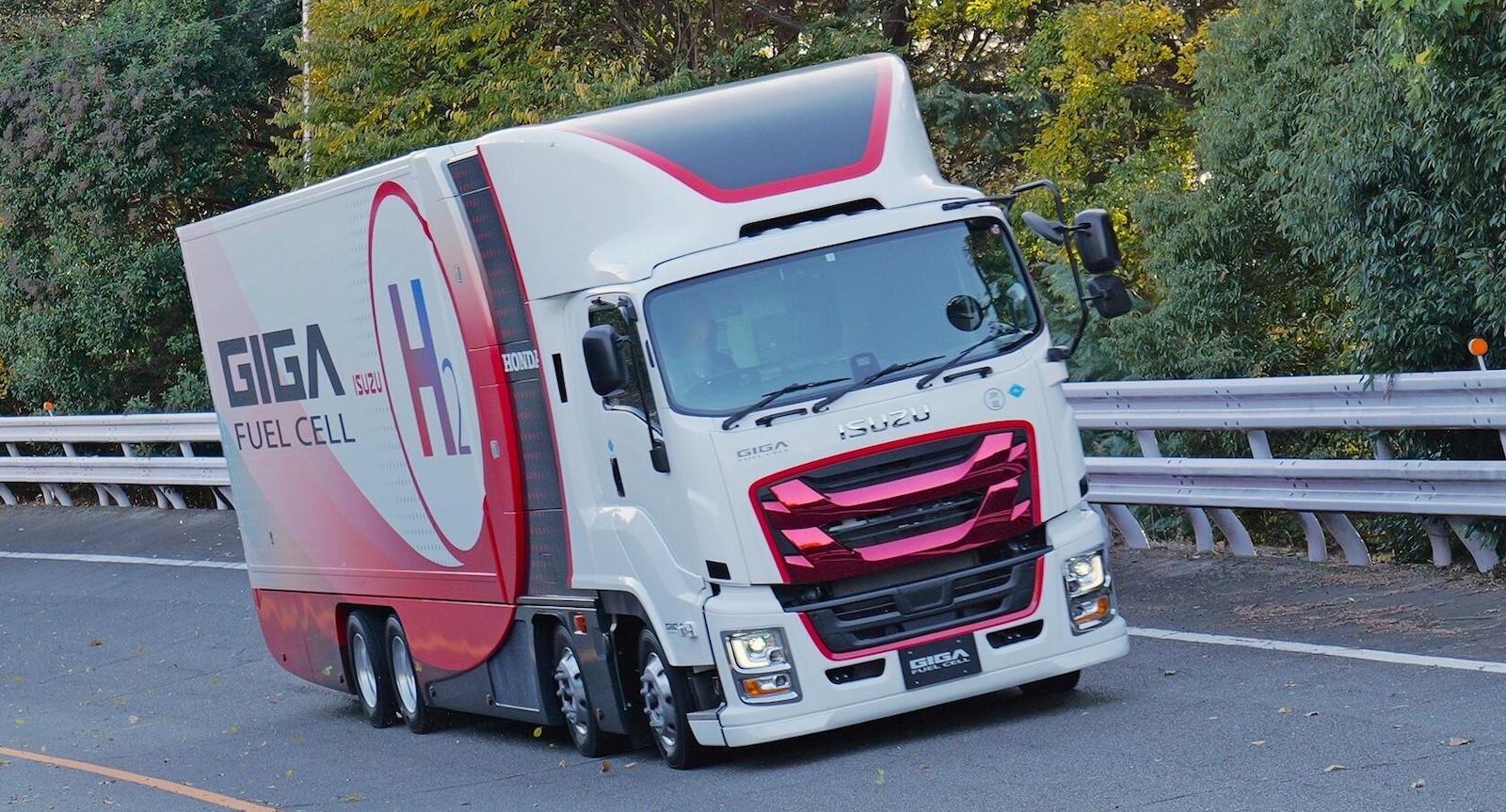Hydrogen Fuel Cell Electric Trucks Are Coming, Ready Or Not Leave a comment
Sign up for daily news updates from CleanTechnica on email. Or follow us on Google News!
The road ahead has not gotten much easier for fuel cell cars, but trucks are a different matter. Just a couple of weeks ago, Isuzu and Honda kicked off a months-long road test of their GIGA FUEL CELL heavy-duty truck, ahead of a commercial launch anticipated in 2027. They better act fast, because more fuel cell trucks are headed for the highways this year.
The Fuel Cell Electric Truck Advantage
One might wonder why anyone is bothering to introduce fuel cell electric trucks to the market, when battery-electric trucks are already on the way and battery technology is improving practically by the minute.
That’s a good question. It remains to be seen how things shake out over the long run, but trucks are going to decarbonize, one way or another.
The market research IDTechEx points out that only 10% of vehicles on the road toady are medium- and heavy-duty trucks, but they contribute an outsized share — about 40% — of greenhouse gas emissions in the transportation sector.
“If the global community is going to…limit the impact of climate change then a rapid decarbonisation of the truck sector must be a priority,” they add. “Consequently, the days of the fossil fuel powered combustion engine truck are numbered.”
Ouch!
In a 20-year market outlook report from 2023 to 2043, IDTechEx notes that battery-electric vehicles have already established a foothold, but that “the energy density and specific energy of current lithium-ion battery technologies can mean that the range of battery electric trucks is restricted by both the maximum weight of batteries that can be carried by a truck, and the available space for batteries within that vehicle.”
That’s where the door for fuel cell electric trucks opens. IDTechEx takes care to note that costs and fueling infrastructure pose challenges, but fuel cells offer “an avenue to greater range, whilst still delivering the crucial reduction in on-road exhaust emissions.”
Isuzu And Honda Agree
Honda has been on a long, elaborate fuel cell journey with many patents in its pocket. That includes a partnership with GM, culminating in the launch of a compact, next-generation fuel cell module last year.
The new fuel cell seems to be heading for the GIGA FUEL CELL heavy-duty truck. Honda has also been collaborating with Isuzu since 2020, and last spring Isuzu tapped Honda to supply fuel cells for its planned line of heavy-duty zero emission trucks.
The new GIGA FUEL CELL electric truck was unveiled at the Japan Mobility Show last October, right next to Isuzu’s new Erga EV battery-electric bus, leading up to the beginning of on-road testing in December.
‘Isuzu and Honda believe that FC technology, utilizing hydrogen as fuel resulting in no CO2 emissions, will be effective to achieve carbon neutrality of heavy-duty trucks which are required to achieve high-efficiency transportation (with the capability for long-distance driving, large load capacity, quick refueling),” the companies stated in a joint press release on December 22.
More Fuel Cell Electric Trucks For The European Union
Also in December, CleanTechnica took note of the F-MAX fuel cell electric truck prototype in the works from the Ford Trucks division of the Turkish auto maker Ford Otosan, a publicly traded firm shared between The Ford Motor Company and a Turkish holding company.
The project launched with the delivery of two “FCmove™-XD” 120-kilowatt fuel cell engines from Ballard Power Systems, and the EU has already enlisted the vehicle in its ZEFES truck decarbonization study.
“Ford Trucks’ fuel cell-powered lorry is a key step on the path to EU-backed ZEFES project’s goal to help decarbonise Europe’s long-haul goods transport,” the European Commission observes.
ZEFES stands for “Zero Emissions flexible vehicle platforms with modular powertrains serving the long-haul Freight Eco System.”
The 42-month, EU-funded effort kicked off last January. It is tasked with collecting and assessing real world data from a mixed fleet of zero emission trucks, including six battery electric trucks and three fuel cell electric trucks. The trucks will be on the road for a 15-month period beginning in 2025.
The ZEFES study is nowhere near complete, but the EU appears resolved to include hydrogen fuel cell trucks in its decarbonization strategy.
“The transport sector is responsible for about 20 % of Europe’s greenhouse gas emissions,” explains the EU’s Community Research and Development Information Service. “In the efforts to decarbonise it, clean hydrogen plays an important role, especially in sectors such as long-haul transport, where it has proven more difficult to reduce emissions.”
Next-Generation Fuel Cells From Hyundai And Kia
Not to be outdone, last week Hyundai and its Kia branch announced that they, too, are stepping up their fuel cell venture, in a new collaboration with the US materials science firm W. L. Gore & Associates. The three companies aim to develop a new, next-generation polymer electrolyte membrane for fuel cell electric trucks and other commercial vehicles.
“The joint effort between the parties will encompass key aspects of PEM development. The ultimate goal of this collaboration is to develop an advanced PEM for next-generation fuel cell electric commercial vehicles,” Hyundai and Kia explained.
The two companies note that they have already been collaborating on fuel cell technology for the past 15 years, with Hyundai contributing 25 years’ worth of hydrogen and fuel cell R&E to the effort.
More Hydrogen Fuel Cell Electric Trucks
Daimler Truck’s new Mercedes-Benz GenH2 hydrogen fuel cell truck also crossed the CleanTechnica just a few weeks ago.
“The new truck is aimed at operations that are less than optimal for battery-electric trucks, and five leading stakeholders have already signed up to give it a whirl,” we noted. Amazon, Air Products, INEOS, Holcim and Wiedmann & Winz will be assessing the truck on their routes in Europe.
On January 9 another truck maker, Hyzon Motors, issued a recap of its fuel cell activities over the past year. The company highlighted the delivery of 19 fuel cell trucks, split among the US, Europe, and Australia. That seems like pretty small potatoes, but the company is looking to scale up this year.
“Paired with continued advancement of U.S. and international government investment in the hydrogen ecosystem, we expect significant achievements in 2024, including Start of Production (SOP) for our 200kW fuel cell system, delivering the first 200kW FCEVs into trial, and advancing our fuel cell vehicle product offering,” they wrote.
“The North American deployments to fleet and drayage customers include the industry’s first publicly-announced sale and delivery of a heavy-duty fuel cell electric truck in the U.S.,” Hyzon noted.
“Delivery to the drayage customer, operating out of the Port of Los Angeles and Long Beach, marks the company’s entry into the U.S. drayage market, which Hyzon expects to be a significant long-term growth driver,” they added.
The US startup Nikola also expects to crack the US market wide open. That remains to be seen, but the company closed out 2023 on a high note, with 35 hydrogen fuel cell trucks delivered to dealers in the US and Canada and more expected to be on their way in 2024.
Follow me @tinamcasey on Bluesky, Threads, Post, and LinkedIn.
Photo: Isuzu and Honda have collaborated on a hydrogen fuel cell electric truck (courtesy of Isuzu).
Have a tip for CleanTechnica? Want to advertise? Want to suggest a guest for our CleanTech Talk podcast? Contact us here.
Our Latest EVObsession Video
I don’t like paywalls. You don’t like paywalls. Who likes paywalls? Here at CleanTechnica, we implemented a limited paywall for a while, but it always felt wrong — and it was always tough to decide what we should put behind there. In theory, your most exclusive and best content goes behind a paywall. But then fewer people read it!! So, we’ve decided to completely nix paywalls here at CleanTechnica. But…
Thank you!
Advertisement
CleanTechnica uses affiliate links. See our policy here.

